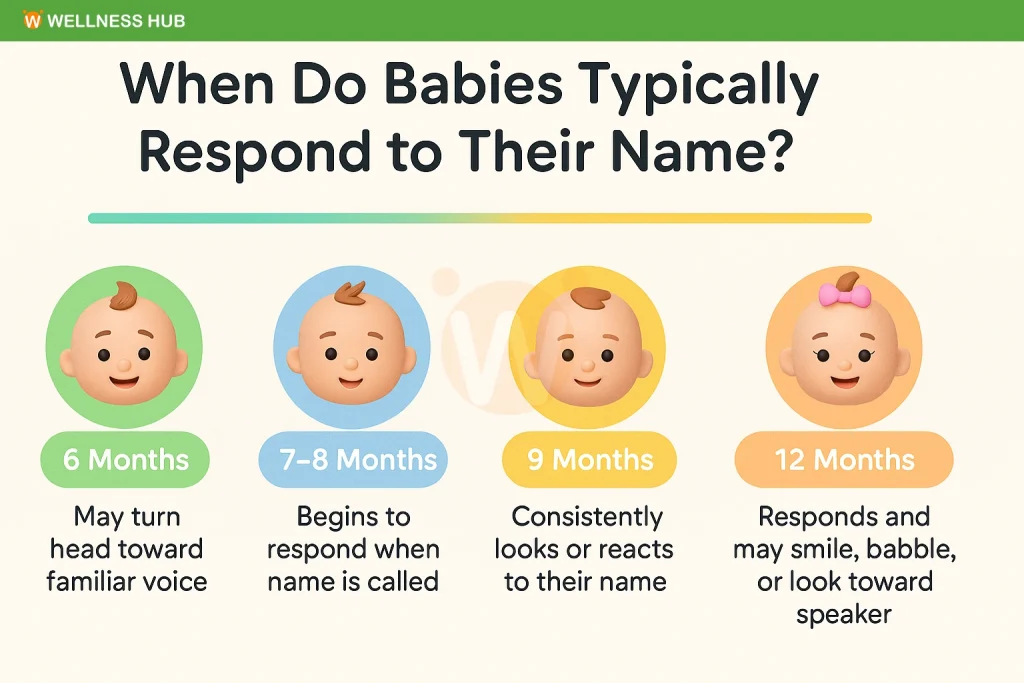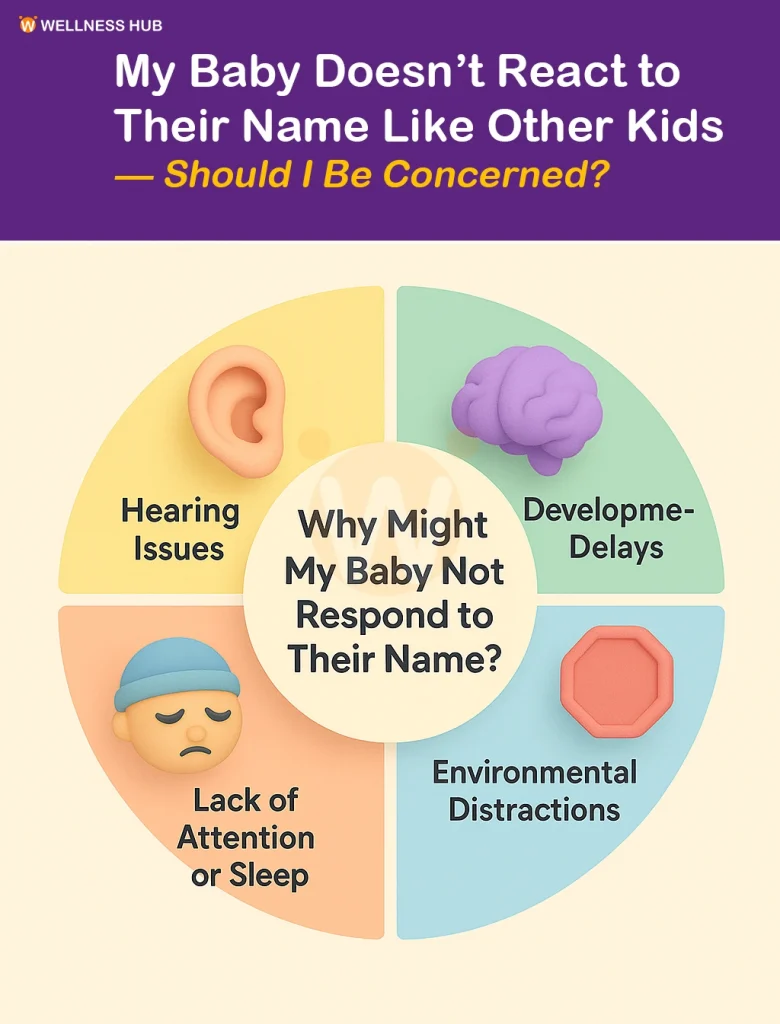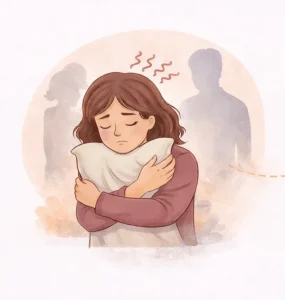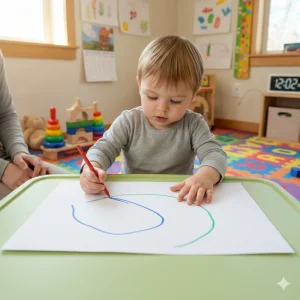Why Isn’t My Baby Responding to Their Name Like Other Kids?
By Rajini D
Last Updated: June 10, 2025
You call your baby’s name — once, twice, maybe more. But they don’t look up. No smile, no glance, no sign they even heard you. Naturally, your mind starts racing: “Should my baby be responding by now? Is something wrong?” First, take a deep breath. You’re not alone, and you’re not the only parent facing this question. Many babies take time to reach social milestones like name response. But if your little one seems to ignore their name often, it might be worth a closer look.
Free Speech Help for Kids
Concerned about speech delays? Book a free consultation with our expert speech therapist and get guidance tailored to your child’s needs.
When Should a Baby Start Responding to Their Name?
It’s one of those heart-melting moments every parent looks forward to — calling your baby’s name and watching them turn their little head toward you. But what if that doesn’t happen? Should you worry?
Most babies start responding to their name between 6 to 9 months of age. This doesn’t mean they’ll react every time, but by around 7 or 8 months, you may notice them looking at you, pausing what they’re doing, or even smiling when they hear their name.
“Responding to name” isn’t just about hearing—it’s a sign that your baby is starting to connect with people and understand social interaction. It might look like:
- Turning their head when you call them
- Making eye contact
- Smiling or making a sound in response
- Pausing their play to look at you
But here’s the important part: every baby is different. Some may respond earlier, others a little later—and that can be perfectly okay.
If your baby is close to 9 months and still not reacting consistently, it might be a good time to observe a few more signs or talk to a pediatrician. Delays in name response could relate to hearing, attention, or early communication skills—but getting help early can make all the difference.

Why Is My Baby Not Responding to Their Name?
If you’ve been calling your baby’s name and getting little to no response, you’re not alone — and your concern is completely valid. While some babies react quickly, others may take a bit more time. Still, it’s important to understand why your baby might not be responding to their name.
There are several possible reasons behind it — and not all of them are cause for alarm.

Hearing Issues
One of the first things to consider is hearing. If your baby can’t hear you clearly, they may not recognize when you’re calling them. Sometimes, even mild or temporary hearing loss (like from an ear infection) can affect how they respond. A simple hearing check can rule this out.
Lack of Attention or Focus
Babies are often deep in their own little world — exploring, staring at a toy, or just taking in their surroundings. If your child is busy or distracted, they might not always react, even if they’ve heard you. This doesn’t always mean something is wrong.
Developmental Delays
If your baby consistently doesn’t react to their name past 9 or 10 months, it could be linked to a developmental delay. This might include speech or social communication delays that are worth exploring further.
Autism Spectrum
One early sign that sometimes appears in children on the autism spectrum is a lack of name response. This doesn’t automatically mean your child has autism — but if you’ve also noticed things like limited eye contact, not pointing to show things, or a lack of social engagement, it may be time to speak with a professional.
What’s Normal — and What’s a Red Flag?
It’s totally normal for babies to miss their name now and then. They may be tired, distracted, or simply not interested in that moment. But if your 9- to 12-month-old rarely or never looks toward you when you call their name, even in quiet settings or when you’re close by, it’s worth paying closer attention.
Trust your instincts. You know your baby best.
Is Not Responding to Name a Sign of Autism?
This is a question many parents find themselves asking — and it’s okay to ask it. If your baby doesn’t respond to their name like other kids, you might wonder if it’s more than just a developmental phase. One possibility that often comes up in these moments is autism.
Let’s take a closer look.
Why Name Response Matters
Responding to their name is one of the first signs that a baby is socially connecting with the world around them. It shows that:
- They recognize a familiar sound (their name)
- They understand someone is trying to get their attention
- They’re interested in that interaction
So when this milestone is delayed or missing, it can be an early sign of a developmental concern like autism — especially if other signs are also present.
Early Signs of Autism in Babies and Toddlers
Here’s a quick overview of what you might notice alongside a lack of name response:
| Social & Communication Signs | Behavioral Signs |
|---|---|
| Doesn’t make eye contact | Repeats actions (rocking, flapping) |
| Rarely smiles at familiar faces | Plays with toys in unusual ways |
| Doesn’t point to show interest | Has very specific routines |
| Doesn’t babble or gesture | May be very sensitive to sound or touch |
You don’t need to see all these signs — but if you notice a few of them consistently, it’s worth exploring further.
Should You Be Worried?
Not necessarily. Some babies are late bloomers. Others might have hearing or attention issues instead. But if your baby is:
- 9 to 12 months old
- Not turning to their name consistently
- Not engaging with people much otherwise
…it’s a good idea to speak with a professional who understands early development.
When to Seek Help
It’s never too early to check in. In fact, early support can make a huge difference in your child’s growth.
At Wellness Hub, our developmental experts offer online screenings and early intervention programs designed for children showing early signs of autism or social delay. Whether it’s just a check-in or something more, we’re here to guide you with clarity and care.
What Should I Do If My Baby Ignores Their Name?
It can feel a little disheartening — you call your baby’s name over and over, but they don’t look up, turn around, or react at all. If your baby seems to ignore their name, don’t panic. There are gentle, everyday ways you can help encourage that response.
Let’s walk through some simple strategies you can try at home.
1. Get Face-to-Face
Babies are still learning how attention works. Sometimes, they genuinely don’t realize you’re talking to them — especially if you’re calling from across the room.
Try this: Lower yourself to their eye level, say their name with a smile, and pause. This helps them connect your voice with your face and makes it easier for them to focus on you.
2. Reduce Distractions
If the TV is on, a toy is making noise, or they’re deeply focused on something, your baby might simply tune everything else out.
Create a quiet, calm moment before calling their name. Fewer distractions mean better chances of a response.
3. Use a Warm, Repetitive Tone
Babies respond better to happy, expressive voices. Calling their name with a gentle sing-song tone — and repeating it a few times — can get their attention better than saying it once in a flat tone
Try: “Riya… Riiiyyaa! Look, Mama’s here!”
4. Repeat and Celebrate Small Wins
Even if your baby just glances your way — that’s progress. Celebrate it with a smile, claps, or praise like “Good looking, sweetie!”
The more positive reinforcement you give, the more your baby will want to respond again.
How Wellness Hub Helps Babies with Name Response and Communication
If your baby isn’t responding to their name as expected, you might be wondering — “What should I do next?” That’s where expert guidance can make a real difference.
At Wellness Hub, we specialize in early intervention programs that support babies and toddlers with communication delays, including name response challenges. Our approach is gentle, personalized, and designed to fit easily into your daily routine.
Online Therapy for Babies Not Responding to Name
Through one-on-one online speech and communication therapy, our certified therapists work closely with you and your child to:
- Improve attention and engagement
- Encourage consistent name response
- Strengthen early communication and social skills
You don’t need to wait months or travel for help — everything happens from the comfort of your home.
Tools That Support You at Home
We don’t just guide your child — we empower you, too. With our BASICS App and home practice resources, you’ll have:
- Easy-to-follow activities tailored to your child’s level
- Video modeling and play-based techniques
- Daily routines that support early speech naturally
Start with a Free Consultation
Not sure if your child needs therapy yet? That’s okay. You can begin with a free developmental consultation. Our experts will listen to your concerns, assess your baby’s communication skills, and recommend next steps that feel right for your family.
Conclusion
If your baby doesn’t respond to their name, you’re not overthinking it — and you’re definitely not alone. Many parents notice something feels “off” before anyone else does. Trust that feeling. It’s okay to ask questions early. Not responding to their name might be a small delay, or it could be an early sign of something like a speech or social challenge. The good news? Early support really helps. Even simple steps at home, paired with the right expert guidance, can make a big difference. At Wellness Hub, we offer free consultations, gentle online therapy for babies, and tools like our BASICS App to help you every step of the way. Don’t wait and worry — take that first step today.
Frequently Asked Questions:
1. When should my baby start responding to their name?
Most babies start to respond to their name between 6 to 9 months. They may turn their head, smile, or make eye contact when they hear you call them. If your baby doesn’t show any reaction by this age, it’s worth keeping an eye on. Early name response is a key communication milestone in baby development.
2. Is it normal if my 1 year old doesn’t respond to their name?
Some children may develop a little later, but by 12 months, most babies usually react when someone says their name. If your 1-year-old doesn’t respond, it might be a sign of a speech delay, hearing issue, or even early autism symptoms. It’s best to get it checked early to understand what’s going on.
3. Can not responding to name be a sign of autism?
Yes, it can be. One of the early signs of autism is when a child does not respond to their name, especially if they also avoid eye contact or have trouble engaging with others. However, it’s not the only sign. A proper evaluation by a therapist can help you get a clear picture.
4. How can I help my baby learn to respond to their name?
You can try simple activities at home. Call your baby’s name in a happy voice, especially when you’re face-to-face. Clap or gently touch their arm to get their attention first. Reduce background noise like TV. When they respond, smile and praise them. This helps babies learn that responding brings good things.
5. Should I be worried if my 9-month-old doesn’t turn when called?
By 9 months, many babies start turning when their name is called. If your child doesn’t turn, look, or react at all, it could be due to a hearing problem, delayed attention, or a possible developmental delay. It’s best not to wait too long and seek guidance from a child expert.
6. Can hearing problems cause my baby to ignore their name?
Yes, hearing issues are one of the most common reasons a baby may not respond. They may not hear you clearly or at all when you call them. A hearing screening is simple and can rule this out. If your child passes the test, then other causes like communication delays can be explored.
7. Is speech delay connected to name response in babies?
Often, yes. A baby who does not respond to their name may also have trouble with speech or language development. They may not pick up sounds or connect words to actions. Speech therapy can support them in building these skills early, making a big difference before school years.
8. What should I do if my baby doesn’t look at me when I call their name?
Start by gently getting their attention. Sit close, say their name clearly, and pause. You can also use fun sounds or toys to help them look. Make sure the room is calm and quiet. If your baby still doesn’t react, don’t wait—getting an expert opinion can give you peace of mind.
9. When should I talk to a doctor about this?
You should talk to your child’s doctor or a therapist if your baby is over 9 months and never looks or turns when their name is called. It’s also important if you notice other signs like not smiling, not pointing, or not making sounds. Early help is always better.
10. How can Wellness Hub help if my baby doesn’t respond to their name?
At Wellness Hub, we understand your concerns. Our team includes certified speech-language therapists, child psychologists, and autism experts who work with children from a young age. We offer online therapy, early assessments, and easy tools like our BASICS app to support your child’s development from home. You can even book a free consultation to get started.
About the Author:
Rajini Darugupally
M.Sc., Speech-Language Pathologist (9+ years of experience)
Rajini is a passionate and dedicated Speech-Language Pathologist with over 9+ years of experience, specializing in both developmental speech and language disorders in children and rehabilitation in adults. Driven by a desire to empower each individual to find their voice, Rajini brings a wealth of experience and a warm, genuine approach to therapy. Currently, at Wellness Hub, she thrives in a team environment that values innovation, compassion, and achieving results for their clients.
Book your Free Consultation Today
Parent/Caregiver Info:
Client’s Details:
* Error Message









